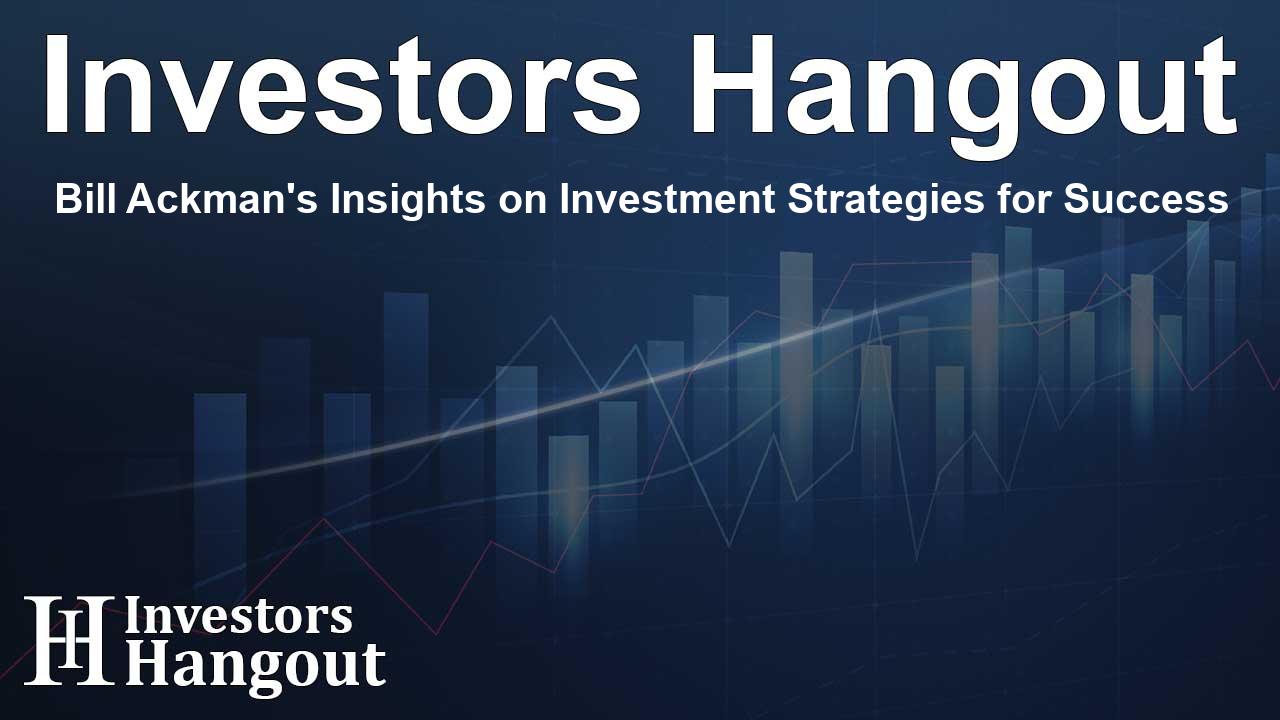Bill Ackman's Insights on Investment Strategies for Success

Investment Wisdom from Bill Ackman
If your investment portfolio feels overwhelming currently, you’re not alone. Legendary investor Bill Ackman has a reassuring message: in the grand scheme of things, any struggles will merely be a 'blip.'
The Journey of Bill Ackman
As the founder of Pershing Square Capital since its inception in 2004, Ackman has skillfully navigated the ups and downs of the investment world, amassing a fortune of approximately $3.7 billion. His journey is marked not just by triumphs, but also by setbacks that have shaped his philosophies toward investing.
The Importance of Long-Term Vision
During a conversation on The Julia La Roche Show in the previous year, Ackman emphasized that holding a long-term perspective is vital when markets become tumultuous. He famously noted, 'If you look at the chart of Pershing Square over time, the difficult periods look like nothing now.' This perspective encourages investors to weather the storm, understanding that short-term fluctuations often fade in significance as time passes.
Pershing Square's Performance
Reflecting on a particularly volatile 2022, Ackman's firm experienced an 8.8% loss amidst market turbulence. However, this dip followed three years of remarkable gains: 26.9% in 2021, 70.2% in 2020, and 58.1% in 2019. Such resilience speaks to his disciplined investment approach.
Foundational Investment Principles
Ackman attributes much of his success to a set of foundational principles he describes as 'basic commandments,' etched in stone at Pershing Square's headquarters. These guidelines form the bedrock of his investment strategy, advocating for the purchase of businesses that are not only stellar performers but also exhibit strong fundamentals.
Identifying Quality Investments
'We want to buy the best businesses in the world,' he explains, pinpointing characteristics such as predictability, strong cash flow, dominance in the market, and, importantly, a protective economic moat. The latter concept, popularized by Warren Buffett, illustrates a company's capacity to maintain competitive advantages over time.
The Role of Governance and Valuation
Ackman also underscores the importance of robust balance sheets, sound governance practices, and reasonable valuations. He advocates for investors to seek out the most 'super-durable' companies that exhibit these qualities, purchasing them at favorable prices. The intention is to ensure that these businesses are not only profitable but also sustainably managed over the long haul.
Red Flags in Investment Choices
While focusing on opportunities, Ackman also warns against potential pitfalls. He advises investors to steer clear of companies that rely heavily on ongoing fundraising to remain viable. His caution extends to shorting stocks, as he believes this strategy often leads to unnecessary risks. 'Stay away from shorting stocks, avoid commodity-sensitive industries, and you do great,' Ackman asserts, pointing toward a proactive approach to investment selection.
Acknowledging Technological Disruption
Ackman delves into the necessity of recognizing potential technological disruptions that could disrupt traditional markets. 'There's a part of investing that's very simple. Just make sure you think about the potential for disruption because we are in a world where technology is a very dynamic force,' he states. This awareness is crucial for adapting investment strategies in an ever-evolving landscape.
Inspired by Timeless Investment Principles
Ackman's approach closely mirrors the sage advice from Warren Buffett: 'Don’t lose money, and don’t forget the first rule.' This illustrates that disciplined investment practices, which prioritize wealth preservation and careful decision-making, are essential to achieving long-term financial goals.
Frequently Asked Questions
What are Bill Ackman's main investment principles?
Bill Ackman's investment principles focus on long-term perspectives, discipline, and identifying companies with strong fundamentals and a competitive edge.
Why does Ackman advise against shorting stocks?
Ackman believes shorting stocks introduces significant risks and is often not a sustainable strategy for long-term investing.
How does Ackman define a 'super-durable' company?
A 'super-durable' company is characterized by strong financial stability, solid governance practices, and the ability to generate consistent cash flow.
What should investors avoid, according to Ackman?
Investors should avoid companies that rely on continuous fundraising and those in commodity-sensitive industries, as per Ackman's guidelines.
How does technological disruption impact investments?
Ackman emphasizes the need for investors to consider the potential for technological changes to disrupt existing business models, impacting investment strategies.
About The Author
Contact Dominic Sanders privately here. Or send an email with ATTN: Dominic Sanders as the subject to contact@investorshangout.com.
About Investors Hangout
Investors Hangout is a leading online stock forum for financial discussion and learning, offering a wide range of free tools and resources. It draws in traders of all levels, who exchange market knowledge, investigate trading tactics, and keep an eye on industry developments in real time. Featuring financial articles, stock message boards, quotes, charts, company profiles, and live news updates. Through cooperative learning and a wealth of informational resources, it helps users from novices creating their first portfolios to experts honing their techniques. Join Investors Hangout today: https://investorshangout.com/
The content of this article is based on factual, publicly available information and does not represent legal, financial, or investment advice. Investors Hangout does not offer financial advice, and the author is not a licensed financial advisor. Consult a qualified advisor before making any financial or investment decisions based on this article. This article should not be considered advice to purchase, sell, or hold any securities or other investments. If any of the material provided here is inaccurate, please contact us for corrections.
